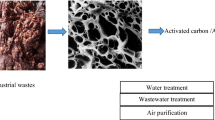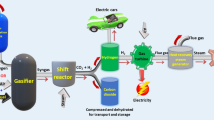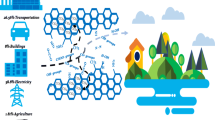Abstract
The tar problems are the major obstacle to developing the biomass pyrolysis technology. The coal chars derived from in situ pyrolysis and/or partially gasification are a promising alternative tar cracking catalyst with great industrial application potential because of its cheap and easily available characteristics. This work investigated the application of lignite chars as catalysts for biomass tar decomposition. Raw lignite char was further gasified with CO2 for 5 min (GC5) and 15 min (GC15) and used as tar cracking catalysts. Effects of pyrolysis temperature, char/biomass mass ratio, and pore structure of char on the pyrolysis tar removal were studied. The results showed that increasing pyrolysis temperature and char/biomass mass ratio would promote tar decomposition. When using GC15 as catalyst, tar yield was as low as 0.10 wt% at the temperature of 850 °C and the mass ratio of 2. Gasification treatment increased the specific surface area of raw char from 284.1 to 342.7 m2/g (GC5) and 435.6 m2/g (GC15). Comparing the catalytic activity of lignite chars with commercial activated carbon demonstrated that mesopores were more influential than micropores in tar removal. In addition, water produced during biomass pyrolysis could in situ contribute to tar reforming and char gasification reactions. The results obtained in this study suggested that a cheaper coal char-based catalyst with excellent performance for biomass tar cracking could be achieved by combining with a coal gasification process and optimizing gasification conditions.







Similar content being viewed by others
Data availability
The datasets used and/or analyzed during the current study are available from the corresponding author upon reasonable request.
References
Al-Rahbi AS, Onwudili JA, Williams PT (2016) Thermal decomposition and gasification of biomass pyrolysis gases using a hot bed of waste derived pyrolysis char. Bioresour Technol 204:71–79. https://doi.org/10.1016/j.biortech.2015.12.016
Bai Y, Lv P, Yang X et al (2018) Gasification of coal char in H2O/CO2 atmospheres: evolution of surface morphology and pore structure. Fuel 218:236–246. https://doi.org/10.1016/j.fuel.2017.11.105
Bhandari PN, Kumar A, Bellmer DD, Huhnke RL (2014) Synthesis and evaluation of biochar-derived catalysts for removal of toluene (model tar) from biomass-generated producer gas. Renew Energy 66:346–353. https://doi.org/10.1016/j.renene.2013.12.017
Cao J-P, Ren J, Zhao X-Y et al (2018) Effect of atmosphere on carbon deposition of Ni/Al2O3 and Ni-loaded on lignite char during reforming of toluene as a biomass tar model compound. Fuel 217:515–521. https://doi.org/10.1016/j.fuel.2017.12.121
Cha JS, Park SH, Jung S-C et al (2016) Production and utilization of biochar: a review. J Ind Eng Chem 40:1–15. https://doi.org/10.1016/j.jiec.2016.06.002
Cutz L, Haro P, Santana D, Johnsson F (2016) Assessment of biomass energy sources and technologies: the case of Central America. Renew Sustain Energy Rev 58:1411–1431. https://doi.org/10.1016/j.rser.2015.12.322
Dabai F, Paterson N, Millan M et al (2010) Tar formation and destruction in a fixed-bed reactor simulating downdraft gasification: equipment development and characterization of tar-cracking products. Energy Fuels 24:4560–4570. https://doi.org/10.1021/ef100681u
Du S, Dong Y, Guo F et al (2021) Preparation of high-activity coal char-based catalysts from high metals containing coal gangue and lignite for catalytic decomposition of biomass tar. Int J Hydrog Energy 46:14138–14147. https://doi.org/10.1016/j.ijhydene.2021.01.179
Fagbemi L (2002) Pyrolysis products from different biomasses: application to the thermal cracking of tar. Fuel Energy Abstr 43:279. https://doi.org/10.1016/S0140-6701(02)86434-7
Gilbert P, Ryu C, Sharifi V, Swithenbank J (2009) Tar reduction in pyrolysis vapours from biomass over a hot char bed. Bioresour Technol 100:6045–6051. https://doi.org/10.1016/j.biortech.2009.06.041
Guo S, Peng J, Li W et al (2009) Effects of CO2 activation on porous structures of coconut shell-based activated carbons. Appl Surf Sci 255:8443–8449. https://doi.org/10.1016/j.apsusc.2009.05.150
Guo F, Li X, Liu Y et al (2018) Catalytic cracking of biomass pyrolysis tar over char-supported catalysts. Energy Convers Manag 167:81–90. https://doi.org/10.1016/j.enconman.2018.04.094
Guo F, Liang S, Jia X et al (2020) One-step synthesis of biochar-supported potassium-iron catalyst for catalytic cracking of biomass pyrolysis tar. Int J Hydrog Energy 45:16398–16408. https://doi.org/10.1016/j.ijhydene.2020.04.084
Han L, Liu Q, Zhang Y et al (2020) A novel hybrid iron-calcium catalyst/absorbent for enhanced hydrogen production via catalytic tar reforming with in-situ CO2 capture. Int J Hydrog Energy 45:10709–10723. https://doi.org/10.1016/j.ijhydene.2020.01.243
Islam MW (2020) A review of dolomite catalyst for biomass gasification tar removal. Fuel 267:117095. https://doi.org/10.1016/j.fuel.2020.117095
Kastner JR, Mani S, Juneja A (2015) Catalytic decomposition of tar using iron supported biochar. Fuel Process Technol 130:31–37. https://doi.org/10.1016/j.fuproc.2014.09.038
Liu R, Zhang Y, Ling Z, Song Y (2020) Some new insights into the synergy occurring during char gasification in CO2/H2O mixtures. Fuel 268:117307. https://doi.org/10.1016/j.fuel.2020.117307
Lu Q, Zhang T, Deng X et al (2020) Enhancement of gas and aromatics by in-situ catalytic pyrolysis of biomass in the presence of silica gel. Biomass Bioenergy 138:105567. https://doi.org/10.1016/j.biombioe.2020.105567
Paethanom A, Nakahara S, Kobayashi M et al (2012) Performance of tar removal by absorption and adsorption for biomass gasification. Fuel Process Technol 104:144–154. https://doi.org/10.1016/j.fuproc.2012.05.006
Park J, Lee Y, Ryu C (2016) Reduction of primary tar vapor from biomass by hot char particles in fixed bed gasification. Biomass Bioenergy 90:114–121. https://doi.org/10.1016/j.biombioe.2016.04.001
Peng WX, Wang LS, Mirzaee M et al (2017) Hydrogen and syngas production by catalytic biomass gasification. Energy Convers Manag 135:270–273. https://doi.org/10.1016/j.enconman.2016.12.056
Phuphuakrat T, Namioka T, Yoshikawa K (2010) Tar removal from biomass pyrolysis gas in two-step function of decomposition and adsorption. Appl Energy 87:2203–2211. https://doi.org/10.1016/j.apenergy.2009.12.002
Qian K, Kumar A, Zhang H et al (2015) Recent advances in utilization of biochar. Renew Sustain Energy Rev 42:1055–1064. https://doi.org/10.1016/j.rser.2014.10.074
Ren J, Liu Y-L, Zhao X-Y, Cao J-P (2020) Biomass thermochemical conversion: a review on tar elimination from biomass catalytic gasification. J Energy Inst 93:1083–1098. https://doi.org/10.1016/j.joei.2019.10.003
Ren J, Cao J-P, Zhao X-Y, Liu Y-L (2021) Fundamentals and applications of char in biomass tar reforming. Fuel Process Technol 216:106782. https://doi.org/10.1016/j.fuproc.2021.106782
Shen Y (2015) Chars as carbonaceous adsorbents/catalysts for tar elimination during biomass pyrolysis or gasification. Renew Sustain Energy Rev 43:281–295. https://doi.org/10.1016/j.rser.2014.11.061
Shen Y, Yoshikawa K (2013) Recent progresses in catalytic tar elimination during biomass gasification or pyrolysis—a review. Renew Sustain Energy Rev 21:371–392. https://doi.org/10.1016/j.rser.2012.12.062
Song Y, Wang Y, Hu X et al (2015) Effects of volatile–char interactions on in-situ destruction of nascent tar during the pyrolysis and gasification of biomass. Part II. Roles of steam. Fuel 143:555–562. https://doi.org/10.1016/j.fuel.2014.11.096
Takise K, Imori M, Mukai D et al (2015) Effect of catalyst structure on steam reforming of toluene over Ni/La0.7Sr0.3AlO3− catalyst. Appl Catal Gen 489:155–161. https://doi.org/10.1016/j.apcata.2014.10.014
Takise K, Higo T, Mukai D et al (2016) Highly active and stable Co/La0.7Sr0.3AlO3− catalyst for steam reforming of toluene. Catal Today 265:111–117. https://doi.org/10.1016/j.cattod.2015.08.059
Wan Z, Sun Y, Tsang DCW et al (2019) A sustainable biochar catalyst synergized with copper heteroatoms and CO 2 for singlet oxygenation and electron transfer routes. Green Chem 21:4800–4814. https://doi.org/10.1039/C9GC01843C
Wang F-J, Zhang S, Chen Z-D et al (2014) Tar reforming using char as catalyst during pyrolysis and gasification of Shengli brown coal. J Anal Appl Pyrolysis 105:269–275. https://doi.org/10.1016/j.jaap.2013.11.013
Wang S, Shan R, Lu T et al (2020) Pyrolysis char derived from waste peat for catalytic reforming of tar model compound. Appl Energy 263:114565. https://doi.org/10.1016/j.apenergy.2020.114565
Widyawati M, Church TL, Florin NH, Harris AT (2011) Hydrogen synthesis from biomass pyrolysis with in situ carbon dioxide capture using calcium oxide. Int J Hydrog Energy 36:4800–4813. https://doi.org/10.1016/j.ijhydene.2010.11.103
Wu W, Luo Y, Su Y et al (2011) Nascent biomass tar evolution properties under homogeneous/heterogeneous decomposition conditions in a two-stage reactor. Energy Fuels 25:5394–5406. https://doi.org/10.1021/ef2007276
Xie Y, Su Y, Wang P et al (2018) In-situ catalytic conversion of tar from biomass gasification over carbon nanofibers- supported Fe-Ni bimetallic catalysts. Fuel Process Technol 182:77–87. https://doi.org/10.1016/j.fuproc.2018.10.019
Xiong X, Yu IKM, Cao L et al (2017) A review of biochar-based catalysts for chemical synthesis, biofuel production, and pollution control. Bioresour Technol 246:254–270. https://doi.org/10.1016/j.biortech.2017.06.163
Zhang Y, Wu W, Zhao S et al (2015) Experimental study on pyrolysis tar removal over rice straw char and inner pore structure evolution of char. Fuel Process Technol 134:333–344. https://doi.org/10.1016/j.fuproc.2015.01.047
Zhang Y, Zheng Y, Yang M, Song Y (2016) Effect of fuel origin on synergy during co-gasification of biomass and coal in CO2. Bioresour Technol 200:789–794. https://doi.org/10.1016/j.biortech.2015.10.076
Zhang J, Ren M, Li X et al (2019) Syngas production by integrating CO2 partial gasification of pine sawdust and methane pyrolysis over the gasification residue. Int J Hydrog Energy 44:19742–19754. https://doi.org/10.1016/j.ijhydene.2019.06.014
Zhao X-Y, Ren J, Cao J-P et al (2017) Catalytic reforming of volatiles from biomass pyrolysis for hydrogen-rich gas production over limonite ore. Energy Fuels 31:4054–4060. https://doi.org/10.1021/acs.energyfuels.7b00005
Funding
The authors are grateful to the financial supports from the National Natural Science Foundation of China (Grant No. 51676028).
Author information
Authors and Affiliations
Contributions
All authors contributed to the study conception and design. Material preparation, data collection, and analysis were performed by Hao Zhang and Xingli Gong. The first draft of the manuscript was written by Chongcong Li and revised by Yan Zhang. All authors read and approved the final manuscript.
Corresponding author
Ethics declarations
Ethics approval
Not applicable.
Consent to participate
Not applicable.
Consent for publication
Not applicable.
Competing interests
The authors declare no competing interests.
Additional information
Responsible Editor: George Z. Kyzas
Publisher's note
Springer Nature remains neutral with regard to jurisdictional claims in published maps and institutional affiliations.
Rights and permissions
Springer Nature or its licensor (e.g. a society or other partner) holds exclusive rights to this article under a publishing agreement with the author(s) or other rightsholder(s); author self-archiving of the accepted manuscript version of this article is solely governed by the terms of such publishing agreement and applicable law.
About this article
Cite this article
Li, C., Zhang, H., Gong, X. et al. Catalytic performance of activated lignite chars on biomass tar cracking. Environ Sci Pollut Res 30, 57331–57339 (2023). https://doi.org/10.1007/s11356-023-26541-0
Received:
Accepted:
Published:
Issue Date:
DOI: https://doi.org/10.1007/s11356-023-26541-0




